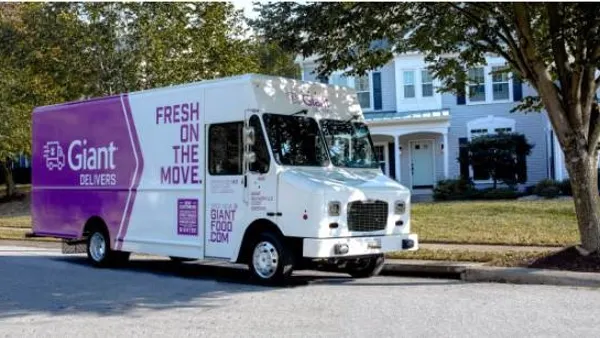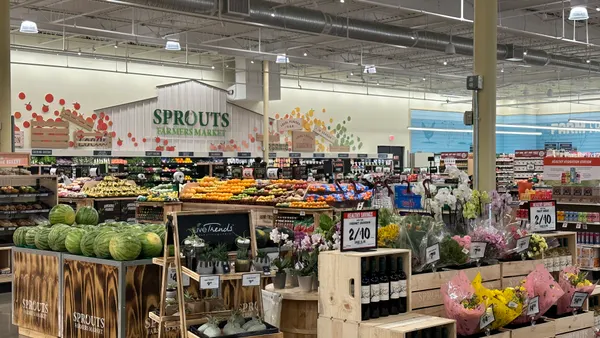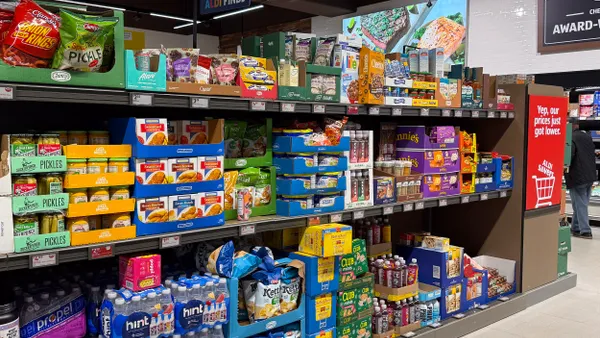Dive Brief:
-
In collaboration with price comparison and coupon provider GoodRx, Kroger launched its own membership program for prescription drugs that aims to cut up to 85% of typical costs for consumers, the company announced Wednesday. Rx Savings Club offers exclusive discounts to generic medications that treat common ailments such as diabetes and asthma.
-
Annual memberships run $36 for individuals and $72 for families of up to six people. Kroger estimates that one person can save $461 per year, or $1,064 for families, according to the program page. More than 100 regularly prescribed generic drugs then cost members nothing, $3 or $6, depending on the drug.
-
Kroger operates more than 2,000 retail pharmacies in 37 states and just this week purchased records from 42 Shopko stores. The grocer will also be unveiling miniature grocery shops inside more than a dozen Walgreens locations.
Dive Insight:
Major drugstores including Walgreens and RiteAid offer discount programs, but consumers can often find better deals at other retailers. Walmart advertises $10 for a 90-day supply of generic drugs. Publix offers the same supply of certain drugs for free or for $7.50. Costco covers up to 80% of costs for drugs not covered by insurance.
While Kroger's Shopko investment highlighted the grocer's commitment to Wisconsin, where 25 of the 42 stores transferring files are located, the Rx Savings Club takes advantage of the grocer’s nationwide network. Expanding its Wellness Your Way initiative, through which customers can gain nutrition tips, make shopping lists and read about health topics, a prescription drug loyalty program tackles a dire need in the U.S. right now.
Drug prices have soared in the past fifteen years, jumping 13% in 2014 and another 12% in 2015, according to a report by the Campaign for Sustainable Rx Pricing. Out-of-pocket costs will hit $67 billion by 2025, a 168% increase from 2000. In 2011, two former Facebook executives started GoodRx, essentially a data-based tech company, to help consumers compare current generic drug prices and discounts to find the pharmacy with the best price.
The “tangled web” of manufacturers, middlemen, insurers, doctors and retailers controlling pharmaceuticals confuses and costs the public, says Consumer Reports. Many in the U.S. have struggled to keep up. Nearly 10% of consumers who saw the cost of their medications rise took a second job to pay for them, while more than 30% used credit more often and spent less on family and grocery needs.
Kroger could be smart to enter the discount pricing game now, as prices continue to rise and laws lag behind full-scale solutions. The American Medical Association found that Medicare and Medicaid patients overpaid for 28% of generic drugs. Worse, they overpaid by a third for 12 of the 20 most commonly prescribed drugs. Congress passed a bill in October that bans so-called “gag clauses” that prohibited pharmacists from informing customers of lower-cost options. (A trade group representing pharmacy managers told Kaiser Health News that gag orders are increasingly rare.) Now pharmacists can freely share such information, but the law doesn’t require it unless the customer asks.
By focusing on generic drugs, Kroger’s Rx Savings Club will likely attract new customers to the pharmacy and the grocery, too. Supermarkets accounted for just under 15% of pharmacy prescriptions in 2016, up 6.5% from the previous year. Publix, Giant Eagle and Southeastern Grocers have developed robust pharmacy arms that compete shoulder-to-shoulder with the likes of Walgreens and CVS. Many now also house walk-in clinics.
CVS has landed in Target stores nationwide, while Walmart has eyed buying insurer Humana outright, transforming the insurer-retailer relationship. As the nation’s largest retailer, Walmart controls double the market of second-place Kroger at $180 billion annually. In a continuing effort to diversify and help customers truly one-stop shop, Kroger sees a viable opportunity in saving people money on everything they need to stay healthy.









